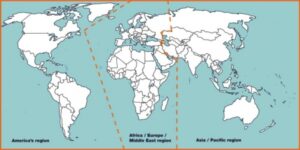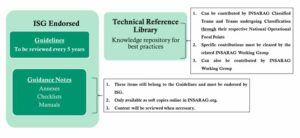Report_on_the_INSARAG_Meeting_for_Latin_America_and_the_Caribbean.doc
Author: admin
The Regional Group Meeting 2004 was held in Lima, Peru. The meeting was attended by 97 participants from 21 countries and organisations.
2004 INSARAG Americas Meeting Chairman Summary (French)
2004 INSARAG Americas Meeting Chairman Summary (Arabic)
The annual meeting of INSARAG Americas Regional Group was held in Fairfax County, USA from 2nd to 5th May 2002. The meeting was attended by 63 participants from 16 countries and 5 organizations.
2002 INSARAG Americas Meeting Report (English)
2002 INSARAG Americas Meeting Report (Spanish)
The INSARAG is organised into the three regional groups: Africa/Europe/Middle East Region, Americas Region and Asia/Pacific Region. These Regional Groups meet annually to take measures to strengthen regional USAR response and ensure the strategic direction and policies from the INSARAG Steering Group are implemented and to assimilate relevant information from participating countries for submission to the INSARAG Steering Group.
Regional Groups encourage the participation of all countries in their region and aim to provide a forum to discuss USAR related issues, regional cooperation and capacity building. One of the primary outcomes of these meetings is an annual regional work plan that addresses capacity building, training and other issues relevant to integrated approaches to disaster response. Each Regional Group has at least one Chairperson and Vice-Chairperson, elected annually and sits on the INSARAG Steering Group.
For more details on regional events, such as exercises and meetings, visit the links to each region’s dedicated page.
INSARAG Global / Regionals Chairs
| Funktion | Country | Name | Position | |
| Global Chair | Swiss | Incoming Global Chair | Ambassador Dominik Stillhart | Deputy Director General of the Swiss Agency for Development and Cooperation, Head of Humanitarian Aid Department and Head of the Swiss Humanitarian Aid Unit (SHA) |
| AEME Regional Chair | Romania | Current Chair: | Brigadier General Dogeanu Marius | Head of Directorate General for Civil Protection Ministry of Internal Affairs, Romania |
| Czech Republic | Incoming Chair: | Lieutenant General Vladimir Vlcek | Chief Fire Officer and representatives of the Fire Rescue Service of the Czech Republic (FRS CR), Czech Republic | |
| Qatar | Outgoing Chair: | Colonel Staff Mubarak Sherida Al Kaabi | Commander and Head of Qatar International Search and Rescue Group (QSART), Qatar | |
| Americas Regional Chair | Ecuador | Current Chair: | Mr. Jorge Carrillo | Risk Management Secretary, Ecuador |
| Brazil | Incomming Chair | Mr. Jose Solla | Coordinator General for Humanitarian Cooperation Brazilian Cooperation Agency (ABC), Brazil | |
| Mr. Wolnei Wolff | National Secretariat for Protection and Civil Defence, Brazil | |||
| Argentina | Outgoing Chair | Ambassador Eduardo Porretti, | President of the White Helmets Commission, Argentina | |
| Asia-Pacific Regional | Pakistan | Current Chair | Mr. Muhammad Idrees | Policy Focal Point for the National Disaster Management Agency (NDMA), Pakistan |
| Japan | Incomming Chair | Mr. Kazuki Matsubara | Director of Humanitarian Assistance and Emergency Relief Division International Cooperation Bureau, Ministry of Foreign Affairs, Japan | |
| New Zealand | Outgoing Chair | Mr. Paul Turner | National Manager Response Capability Fire and Emergency, New Zealand |

The INSARAG Technical Guidance Notes provide non-binding guidance to USAR teams beyond what is specified as minimum requirements by the INSARAG Guidelines. These Technical Guidance Notes are prepared by the INSARAG working groups and then endorsed by the INSARAG Steering Group. Please note that these Technical Guidance Notes are not parts of the INSARAG Guidelines, they are only good practices and recommendations. They are not the expectations from INSARAG member USAR teams or those USAR teams that undergo the INSARAG External Classification (IEC) process.
The following Technical Guidance Notes have been endorsed so far:
Medical Guidance Notes:
1. Amputations and Dismemberment (endorsed in 2011)2. Identification of USAR Medical Personnel (endorsed in 2011)
3. Post Mission Medical Reporting (endorsed in 2011)
4. Provision of Medical Care in an Austere Environment Specifically in a Confined Space (endorsed in 2011)
5. Recovery of Deceased During USAR Operations (endorsed in 2011)
6. The Donation of Medical Supplies and Equipment Prior to Demobilisation (endorsed in 2011)
7. The Medical Management of the Entrapped Patient with Crush Syndrome (endorsed in 2019)
8. Patient Treatment Record (endorsed in 2012)
9. Urban Search and Rescue in Extreme Environmental Conditions (endorsed in 2014) 10. INSARAG Injury and Illness Log (endorsed in 2019) 11. Template Letter requesting Ability to Practice USAR Medicine (endorsed in 2019) 12. INSARAG Patien Treatment Form (endorsed in Octobor 2019)
Recommended USAR Operations Guidance Notes by the Training Working Group:
1. Generic Risk Assessments – Rescues From Confined Spaces and Collapsed Structures (Source: UK) (uploaded June 2013)2. Manual for cold conditions (Source CMCFinland) (Upload October 2013).
3. USAR dogs and cold conditions (Source CMCFinland) (Upload October 2013). 4. Medical Guidance Note – Defining Urban Search and Rescue (USAR) Medicine
Guidelines 2020
The INSARAG Guidelines provides a methodology to guide countries affected by a sudden-onset disaster causing large-scale structural collapse, as well as international USAR Teams responding in the affected country. The Guidelines also outlines the role of the UN in assisting affected countries in on-site coordination.
Reviewed and updated between 2018 to 2020, the INSARAG Guidelines 2020 incorporates six new areas from the 2015 version that were endorsed by the ISG; (i) IER Pre-Greening Process, (ii) INSARAG Recognised National Accreditation Process (IRNAP), (iii) USAR Coordination Cell (UCC), (iv) Information Management, (v) Classified Light Teams and (vi) Beyond the Rubble.
| S/N | Item | Download Link |
| 1 | Volume I – Policy | Link |
| 2 | Volume II, Manual A – Capacity Building | Link |
| 3 | Volume II, Manual B – Operations | Link |
| 4 | Volume II, Manual C – INSARAG External Classification & Reclassification | Link |
| 5 | Volume III – Operational Field Guide | Link |
Note: INSARAG endorsed manuals, selected annexes and checklists have been reorganized and can now be found in the Guidance Notes section.
Other reference notes can be found in the Technical Reference Library.
You can also find the complete Guidelines 2020 with their annexes at the following link: Link

The INSARAG Secretariat welcomes the Members States and donors to translate the Guidelines into other languages for greater outreach.
Please find below the Guidelines in other languages:
Japanese Version (Link)
Hungarian Version (Link)
Spanish Version (Link)
French Version (Link)
Farsi Version (Link)
Provisional – Chinese Version (Link)
The annual meeting of INSARAG Asia-Pacific Regional Group was held in Miami, USA, from 23th to 26th of May 2001. The meeting was attended by more than 70 participants from 15 countries and organizations.
The methodology of INSARAG is described at its Guidelines. The INSARAG Guidelines address international USAR response in a cycle that includes the following phases: Preparedness, Mobilization, Operations, Demobilization and Post-Mission. For each of these phases the INSARAG methodology as defined by the INSARAG Guidelines and the INSARAG Technical Guidance Notes describe what is expected of international USAR teams as they respond to an earthquake affected country. It also describes how coordination between USAR teams should take place and what is expected of the affected country.
Office for the Coordination of Humanitarian Affairs (OCHA)
Palais des Nations – CH 112 Geneva 10, Switzerland
insarag@un.org
Duty officer mobile (emergencies only): +41 22 917 16 00
Secretary of INSARAG
Mr. Sebastian Rhodes Stampa
rhodesstampa@un.org
Office : +41 22 917 59 65
Mobile : +41 79 691 11 80
Mr. Winston Chang (INSARAG Secretariat Worldwide)
changw@un.org
Office: +41 22 917 11 73
Mobile: +41 79 469 85 88
Ms. Haruka Ezaki (INSARAG Secretariat Asia-Pacific)
haruka.ezaki@un.org
Office : +66 2 288 24 23
Mobile : +66 62 592 03 09
Ms. Cecile Thibaud (support Asia-Pacific)
thibaud@un.org
Office : +41 22 917 1394
Mobile : +41 76 691 14 24
Ms. Ana Maria Rebaza (INSARAG Secretariat Americas)
rebaza@un.org
Mobile: +51-9 89581862
Mr. Martin Perez (support Americas)
perez1@un.org
Office: + 41 22 917 32 18
Mobile: +41 79 469 85 90
Mr. Lucien Jaggi (INSARAG Secretariat Middle East and North Africa)
jaggi@un.org
Mobile : +41 76 691 02 26
Ms. Stefania Trassari (INSARAG Secretariat Europe and CIS)
trassari@un.org
Mobile : +41 76 691 02 30
Mr. Clement Kalonga (INSARAG Secretariat Africa )
clement.kalonga@un.org
Office : +254 20 762 2166
Mobile : +254 780 460 582
Ms. Johanna Medina Contreras (support Africa)
medina-poudou@un.org
Office : +41 22 917 1693
Mobile : +41 79 477 08 84

 Home
Home  Contact
Contact